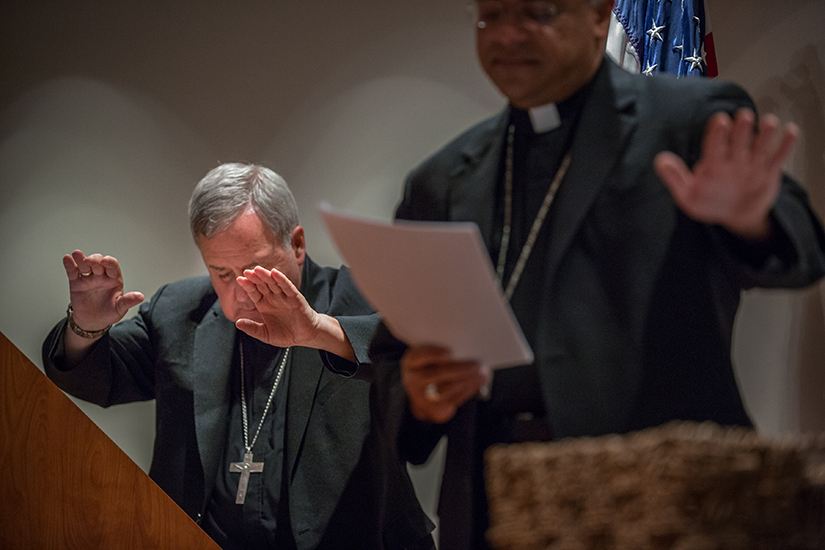Not long after Michael Brown’s death in Ferguson in 2014, Archbishop Robert J. Carlson announced he was re-establishing an archdiocesan commission on human rights. The Peace and Justice Commission, he said, will “assist the citizens and public officials throughout all 11 counties of our archdiocese in the effort to achieve peace and justice for all.”
The commission was formed to look at these issues through the lens of the family, which the Church teaches is the basic structure of humanity. Though established in the wake of Brown’s shooting death by former Ferguson police officer Darren Wilson and subsequent unrest, the Peace and Justice Commission deals with issues beyond Ferguson — social justice issues such as immigration, health services and poverty. The archbishop named Marie Kenyon, former managing attorney of the Catholic Legal Assistance Ministry, as the commission’s director.
 Archbishop Robert J. Carlson, left, and Bishop Shelton J. Fabre, chair of the USCCB ad hoc committee against racism prayed at the end of a listening session against racism at Saint Louis University in 2018. At the session, bishops and other leaders listened as African-American Catholics told painful stories of racism they experienced in the Church.Photo Credits: Lisa Johnston“Jesus tells us that if we receive Him as the Bread of Life, we will have His life within us,” Archbishop Carlson said in his homily at the Mass for Peace and Justice in 2015 at the Cathedral Basilica of Saint Louis, at which the members were commissioned. “He shows what this life means on the Cross, when He forgives those who killed Him.”
Archbishop Robert J. Carlson, left, and Bishop Shelton J. Fabre, chair of the USCCB ad hoc committee against racism prayed at the end of a listening session against racism at Saint Louis University in 2018. At the session, bishops and other leaders listened as African-American Catholics told painful stories of racism they experienced in the Church.Photo Credits: Lisa Johnston“Jesus tells us that if we receive Him as the Bread of Life, we will have His life within us,” Archbishop Carlson said in his homily at the Mass for Peace and Justice in 2015 at the Cathedral Basilica of Saint Louis, at which the members were commissioned. “He shows what this life means on the Cross, when He forgives those who killed Him.”
The archdiocese is uniquely positioned to take on the task with its long history of providing education in Catholic schools, social services through Catholic Charities of St. Louis and its eight affiliate agencies, and health care service in Catholic hospitals. Many parishes have long been active in addressing issues affecting the greater St. Louis community.
Now almost six into its work, the commission has developed ways to address the issue of racial equity in the archdiocese, from the top down.
In 2019, Alice Prince was hired as diversity and inclusion consultant for nine Catholic schools in the archdiocese’s North County Deanery. The position is funded through a $50,000 Beyond Sunday grant from the Roman Catholic Foundation of Eastern Missouri. Also in 2019, Joyce Jones was hired as program director of racial harmony for the archdiocese. In her role, which falls within the auspices of the archdiocesan Peace and Justice Commission, she serves as a resource to parishes in developing relationships among different ethnicities represented within the archdiocese.
In 2018, Archbishop Carlson convened a listening session at Saint Louis University as African-American Catholics shared their personal experiences of racism within the Church. The archdiocese was the first diocese to host a listening session in conjunction with the United States Conference of Catholic Bishops’ ad hoc Committee Against Racism. The bishops hosted the sessions with dioceses to hear firsthand from Black Catholics who have been harmed by acts of racism and to pray for healing, forgiveness and reconciliation.
He described the listening session as an opportunity “to open up what has been painful for so many of our members over the years, and we can begin to deal with the truth that exists.” Soon after the listening session, he celebrated a Mass at the Cathedral Basilica to seek healing for hurt caused by the Church through the sin of racism.
The Archdiocese of St. Louis also is researching its history of owning slaves, in an effort to reconcile its past and recognize its responsibility for participating in the institution of slavery.
In Lent of 2019, the archbishop invited clergy to preach on racism at Masses. His request was in response to several race-related issues, including Michael Brown’s death in Ferguson in 2014; clashes among pacifists, protesters and white supremacists in Charlottesville, Va.; and a 2017 not-guilty verdict in the trial of former St. Louis police officer Jason Stockley charged with first-degree murder in the shooting death of Anthony Lamar Smith.
The archbishop convened several interfaith gatherings in recent years, including a 2017 interfaith prayer service following the Stockley verdict; and a 2019 prayer service against gun violence held at Cardinal Ritter Preparatory High School. He’s also held several meetings with African-American clergy to discuss areas of concern in the community and how the Church can become more involved.
“I realize racism expresses itself in many different ways and when many hear the word they immediately think of policies, institutions, laws, and language,” Archbishop Carlson wrote. “It is certainly part of our history here in Missouri and is found in the social structures that make up society.
“During the 1960s we made many laws as a nation against racism, and some things changed,” he continued. “But we never took the time, as a people, to really talk to one another about this issue, and a deep divide has remained. All people, regardless of race, should be treated with dignity and respect. All children, no matter where they reside, should feel safe in their environment and should benefit from quality education without having to travel out of their neighborhood to receive this benefit. We must do better.”